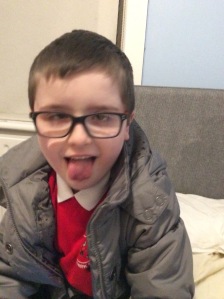
I love the magic of Christmas. I love the way it changes people and they think about others much more. Charities often make more money in December than the rest of the year and children sing carols and cheerful songs at school. Although it is very commercial it can be a real time for families to come together and children can have an excitement and anticipation as they look forward to a special day.
So why would I ruin all that by telling my sweet blue eyed daughter that there really is no such person as Santa?
Firstly I am not advocating this is right for every child. My daughter has autism so I chose to explain there is no such person as Santa for the following reasons:
1. Her literal thinking was causing her so much distress about Santa.
Books, TV programmes and all her friends at school talked about Santa coming down the chimney. We don’t have a chimney and no made up story of magic keys or flying through windows could change the fact that even the song talks about Santa being stuck up the chimney! She took Santa’s grotto as literal too so became very distressed and confused that Santa could be in the middle of the shopping mall, at her school party AND in the North Pole making presents all at the same time? Why did some Santa’s wear glasses and others didn’t? Why would some be tall and thin while others were short and tubby?
There is no enjoyment in the make believe of a story when your child sees everything in black and white and will not ‘play along’ just for the sake of it.
2. Her anxiety over all things Santa was stopping her sleeping.
The very thought that a stranger would enter her house while she was asleep utterly horrified her. Even though the whole story of him leaving gifts for her should have eased that anxiety she was worrying over how Santa would carry everything, wether his reindeer would get too tired or even if she would be forgotten (cheers for that one Peppa Pig!) The very mention of Santa was not exciting my child or making her suddenly want to be on the ‘nice list’, it was in fact causing her to stay awake at night worrying and making her jump every time the door bell rung.
I could not continue to see her so nervous and anxious over something that was meant to be a joyous and wonderful occasion.
3. The social expectations around Santa were all too much for her.
Ok so I know she never had to go and see Santa in his grotto anywhere but when he arrived at her school fair or party she found the whole social aspect very upsetting. Having spent years trying to get her to understand basic social rules such as we don’t talk to strangers and we certainly never sit on other people’s knees all of a sudden she watched in horror as every other child she knew broke all of these social rules just because the ‘stranger’ was dressed in a red suit. Her autism makes breaking any sort of rule horrifying and very distressing so Santa became linked with people doing very strange and confusing things indeed.
4. Her defensiveness and love for her brother was more important that any belief in Santa.
This was the crux for me and the reason I found myself sitting with my daughter on her bed while she cried begging me to tell her Santa was not real. You see my daughter has a brother who has complex needs. He can not speak and has a long list of diagnosis. Part of that means he often has very challenging behaviour for medical and developmental reasons. Her brother had just had a very difficult weekend where he had caused hundreds of pounds of damage to things in the house. He had killed her full tank of tropical fish by pouring bubble bath into the water, yet she still loved him fiercely. So when someone heard about her brother’s behaviour and happened to tell her he would be on Santa’s naughty list and would not get anything for Christmas she hated Santa more than she has ever hated anyone ever before.

So I had to tell her.
Telling my young daughter there is no such person as Santa has been the most magical thing I could have done for her. All of a sudden everything now makes sense to her. She can now reason in her mind how ‘santa’ can be in the shopping centre, the local school and somehow in the North Pole at the same time. She realised that the chimney stuff is all a story and there is no need to fear a stranger coming in her house while she is asleep. She understands why children suddenly want to sit on someone’s knee and tell them what they want for Christmas because the man in red is actually not a stranger to them at all. But most importantly of all she knows without a doubt that her brother will have gifts this year regardless of how challenging and difficult his behaviour can be.
I actually wish I had told her there is no such person as Santa earlier. Now she knows Santa is all made up she is happier and more excited about Christmas than she has ever been before.
She knows she is getting presents, she knows who buys them and she knows how we get them.
For some children with autism the magic of Christmas is actually in finally finding out Santa is not real at all.











